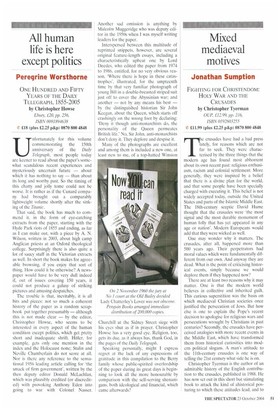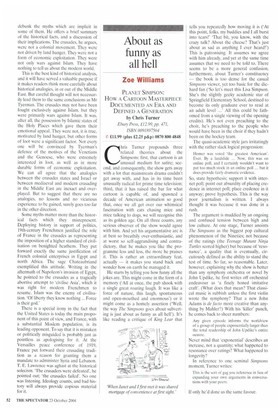Mixed mediaeval motives
Jonathan Sumption
FIGHTING FOR CHRISTENDOM: HOLY WAR AND THE CRUSADES by Christopher Tyerman OUP, £1299, pp. 216. ISBN 0192803255 © £11.99 (plus .£2.25 p&p) 0870 800 4848 The crusades have had a bad press lately, for reasons which are not far to seek. They were characterised by the three things that the modern age has found most abhorrent about its own recent past: religious enthusiasm, racism and colonial settlement. More generally, they were inspired by a belief that there is a divine plan for the world, and that some people have been specially charged with executing it. This belief is not widely accepted today, outside the United States and parts of the Islamic Middle East. The 18th-century sceptic David Hume thought that the crusades were 'the most signal and the most durable monument of human folly that has yet appeared in any age or nation'. Modern Europeans would add that they were wicked as well.
One may wonder why it matters. The crusades, after ail, happened more than 500 years ago. Their perpetrators had moral values which were fundamentally different from our own. And anyway they are dead. What is the point of criticising historical events, simply because we would deplore them if they happened now?
There are at least two reasons why it may matter. One is that the modern world believes in collective and inherited guilt. This curious superstition was the basis on which mediaeval Christian societies once justified the persecution of Jews. But how else is one to explain the Pope's recent decision to apologise for religious wars and persecutions wrought by Christians in past centuries? Secondly, the crusades have perceived analogies with more recent events in the Middle East, which have transformed them from historical curiosities into modern political slogans. A man's attitude to the 11th-century crusades is one way of telling the 21st century what side he is on.
Christopher Tyerrnan is the author of an admirable history of the English contribution to the crusades, published in 1988. He has now set out in this short but stimulating book to attack the kind of ahistorical posturing to which these attitudes lead, and to debunk the myths which are implicit in some of them. He offers a brief summary of the historical facts, and a discussion of their implications. The crusades, he argues, were not a colonial movement. They were not driven by land hunger. They were not a form of economic exploitation. They were not only wars against Islam. They have nothing to tell us about the modern world.
This is the best kind of historical analysis, and it will have served a valuable purpose if it makes readers think more carefully about historical analogies, in or out of the Middle East. But careful thought will not necessarily lead them to the same conclusions as Mr Tyerman. The crusades may not have been fought exclusively against Islam, but they were primarily wars against Islam. It was, after all, the possession by Islamic states of the Holy Places which gave them their emotional appeal. They were not, it is true, motivated by land hunger, but other forms of loot were a significant factor. Not every one will be convinced by Tyerman's defence of the motives of the Venetians and the Genoese, who were extremely interested in loot, as well as in more durable forms of economic exploitation. We can all agree that the analogies between the crusader states and Israel or between mediaeval and modern crusading in the Middle East are inexact and overplayed. But to suggest that there are no analogies, no lessons and no vicarious experience to be gained, surely goes too far in the other direction.
Some myths matter more than the historical facts which they misrepresent. Deploying history in support of politics, 19th-century Frenchmen justified the role of France in the crusades as representing the imposition of a higher standard of civilisation on benighted heathens. They put forward exactly the same justification of French colonial enterprises in Egypt and north Africa. The sage Chateaubriand exemplified this attitude. Writing in the aftermath of Napoleon's invasion of Egypt, he pointed to the crusades as a tragically abortive attempt to 'civilise Asia', which it was right for modern Frenchmen to resume. Islam was the enemy of civilisation. 'Of liberty they know nothing ... Force is their god.'
There is a special irony in the fact that the United States is today the main proponent of this point of view, and France, with a substantial Moslem population, is its leading opponent. To say that it is mistaken or politically misguided is probably just as pointless as apologising for it. At the Versailles peace conference of 1919, France put forward their crusading tradition as a reason for granting them a mandate to administer Syria and Lebanon. T. E. Lawrence was aghast at the historical solecism. 'The crusaders were defeated', he pointed out; 'the crusades failed'. No one was listening. Ideology counts, and had history will always provide copious material for it.

























































































 Previous page
Previous page